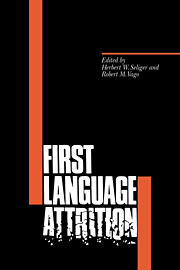Book contents
- Frontmatter
- Contents
- List of figures
- List of tables
- List of contributors
- Acknowledgment
- Part I Survey studies
- Part II Group studies
- 6 L1 loss in an L2 environment: Dutch immigrants in France
- 7 The sociolinguistic and patholinguistic attrition of Breton phonology, morphology, and morphonology
- 8 Language attrition in Boumaa Fijian and Dyirbal
- 9 Pennsylvania German: convergence and change as strategies of discourse
- 10 Lexical retrieval difficulties in adult language attrition
- 11 Spanish language attrition in a contact situation with English
- Part III Case studies
- Index
10 - Lexical retrieval difficulties in adult language attrition
Published online by Cambridge University Press: 14 January 2010
- Frontmatter
- Contents
- List of figures
- List of tables
- List of contributors
- Acknowledgment
- Part I Survey studies
- Part II Group studies
- 6 L1 loss in an L2 environment: Dutch immigrants in France
- 7 The sociolinguistic and patholinguistic attrition of Breton phonology, morphology, and morphonology
- 8 Language attrition in Boumaa Fijian and Dyirbal
- 9 Pennsylvania German: convergence and change as strategies of discourse
- 10 Lexical retrieval difficulties in adult language attrition
- 11 Spanish language attrition in a contact situation with English
- Part III Case studies
- Index
Summary
Introduction
Primary language attrition in adults is likely to occur when the subjects have been uprooted from their natural mother tongue context and transferred to a new language environment. From the point of view of the speakers, a second language is now the dominant language in the new context while their first language has become a restricted mode of communication. The degree of such restriction, the prestige of the first language in the new environment, the level of social distance between the immigrant community and the host community, and the individual degree of acculturation into the new speech community may all have an impact on the degree of erosion which takes place in the subjects' level of competence in their first language.
This chapter will attempt to describe some features of attrition in a context least conducive to primary language erosion and yet exhibiting interesting changes in linguistic competence. The subjects in our study are American speaking immigrants to Israel who continue to maintain English as their dominant language even ten and twenty years after immigration. Although some of the subjects have attained near native proficiency in Hebrew, most have only acquired the language to an extent that fulfills their immediate needs. All subjects continue to use English for reading, entertainment and professional functions.
An important feature of the new environment is the fact that English, the primary language of the attriters, happens to be considered a language of high prestige and utilitarian value in the new community.
- Type
- Chapter
- Information
- First Language Attrition , pp. 139 - 150Publisher: Cambridge University PressPrint publication year: 1991
- 35
- Cited by



